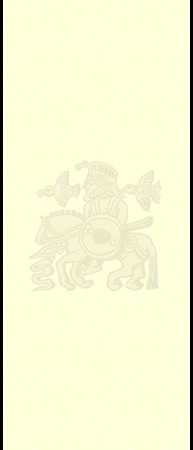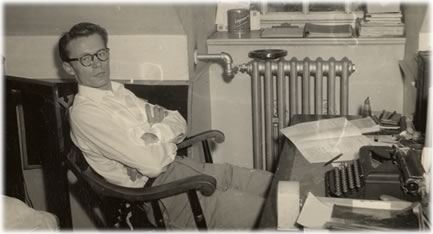



| Web site design and maintenance by Akikaze Media Services. All content of this site, unless otherwise noted, is copyright ©2001 Robert Bly. All Rights Reserved. Any duplication, in any form without the written consent of the copyright holder is prohibited. |
Interviewer: Could you talk about your earliest connections to poetry?
Robert Bly: A beautiful high school teacher interested me in poetry. I think I wrote a poem for her saying that Tojo was a bad person. In the Navy I met the first person I'd known who actually wrote poetry, a man named Eisy Eisenstein. We conspired to flunk out of the radar program on the grounds that we were poets who couldn't be bothered with science. We didn't succeed. Once out of the Navy, I entered St. Olaf College, which is an old Norwegian Lutheran hangout–a Bly was a dean there. My freshman English teacher, to my amazement, excused me from freshman English when I turned in my first piece. That was a generous move; I joined an upperclassmen creative writing group. A woman my age wrote poetry; I fell in love with her, and I wrote a poem to her. I had the strangest sensation. I felt something in the poem I hadn't intended to put there. It was as if "someone else was with me."
Interviewer: Could we talk a little about your beginning poems at Harvard?
Robert Bly: I came to Harvard in the fall of 1947, after having been in the Navy for two years. Robert Creeley, who was there the year before, remarked later that there is something heroic in every writer of our generation, perhaps from the awareness that we had won the war. He mentions somewhere that the standards of American literature were very high at that time–Eudora Welty, Hemingway, Eliot, Stevens, Cummings, Charles Olson. He felt it was our job to keep those standards up.
Interviewer: He also said that your generation felt it was their job to put the culture back together again. Everything was in tatters.
Robert Bly: Yes, there was that mood. The Harvard Advocate had just started up again with its memories and mementos of Eliot and Stevens, who had written for it. Bob Crichton and Bill Emerson took me in, and I took in Don Hall, and we both took in John Ashbery, against much pressure from the trustees of the Advocate, I might add. The night Bill Emerson and Bob Crichton interviewed me for the Board, I answered one of their questions with a critical overview of American poetry since 1910. When I finished, one of them said, "It was good of you to tell us these things." But they took me. We published Adrienne Rich, who was at Radcliffe, and that early poem of John Ashbery's "Some Trees." We stayed up late at night arguing over the next issue. By the way, Adrienne was not allowed to enter the Poetry Room at the new Lamont Library, because the founders said it was for men! That's wild! No one seriously questioned that.

An amazing group of writers were at Harvard at that time. Because of the war, the classes of 1949, ‘48 and ‘47 were bunched up along with the class of 1950. Archibald MacLeish had been hired away from being Director of the Library of Congress. The young writers gathered around him and Albert Guerard, a fine teacher of essay and fiction writing, an American version of a European intellectual. The group I remember included John Hawkes, Bob Crichton, Kenneth Koch, Donald Hall, Frank O'Hara, L. E. Sissman, John Ashbery, a fine fiction writer named Milton Hughes, whom I've never heard of again, Adrienne Rich, George Plimpton, Peter Davison, and many others. Richard Wilbur, a bit older, was in town, and Robert Frost stayed in Boston during the winter.
Archibald MacLeish had a little trouble with us. He was a generous man, but was not prepared to be in the midst of a group of veterans. We were a little older than the normal students, and even though many, like myself, had never been in combat, we were still not about to take orders from someone simply because he was well-known. In class MacLeish might remark, "My friend, Ezra Pound, wrote this poem:
See, they return; ah, see the tentative
Movements, and the slow feet,
The trouble in the pace and the uncertain
Wavering!"
Someone would say, "That's awful. It's crap. Do you have any friends who are better poets?" And so on. We liked him, but we held his feet to the fire. The classes, unlike the scenes at the Library of Congress, were confrontational.
Interviewer: Were you one of the irascible ones?
Robert Bly: Oh, of course. I puffed up my throat like an iguana. MacLeish felt too calm to us, not intense enough. I wasn't the worst one, but I was one of them. One day after three classes or so, he called me into the office and he said, "Robert, you know, this thing can't continue in the way it's going. Either you change your behavior in class, or I'll have to jump out the window." And I said, "Well, jump." I was young; I wanted to show off. He had similar conversations with others, and the upshot was that he didn't meet the class anymore that year; we saw him only one by one. I think he didn't meet any classes for the next three years, until the veterans had all graduated. But it heartened us that MacLeish knew Hemingway and even Pound. We felt we had some contact with writers that really mattered. We weren't touching them, of course, but we weren't that far away either.
Interviewer: You became the literary editor of the Advocate?
Robert Bly: I did. We had a lot to choose from, and we learned a lot arguing over poems and stories. We published our own work as well. I recall reviewing a new book of poems by William Carlos Williams.
Interviewer: Wasn't that a little unusual? He was much out of fashion then. Certainly your teachers didn't mention him; they were in Robert Penn Warren and Eliot's camp, or MacLeish's.
Robert Bly: I guess that's true. Williams did feel ignored and hated. I suppose I found his poems in the Grolier Book Store. Gordon Kearny ran it. Eliot had met Conrad Aiken in that book store; there was a sort of poet's sofa. Poets sat on it. Gordon might say to some freshman who had just wandered in, "Would you take care of the shop for ten minutes?" Then he might not come back for 24 hours! To the poets, that store was a home.
William Carlos Williams was the one who meant the most to me, so I hitchhiked to see him, from Cambridge to Paterson, wearing my chino pants, and I called him from a bar nearby. "Could I come to see you?" "Sure, come on, kid." So he let me in, and said, "Sit down over there. Do you write poetry?" "Well, yeah, I guess so. . .I suppose." He went about his business, planning his deliveries, and typing something. He glanced at me from time to time. After fifteen minutes or so, he said, "OK, kid, you can go now." He understood that I just wanted to look at him. I drifted out, floating along the street. It was heavenly.
But we also admired Eliot, and felt close to him because he'd published his earliest poems in the Advocate. When the Advocate nearly went broke in my senior year, I suggested we put out a sure-fire issue, reprinting Eliot's poems. The excuse was that the issue was "In Honor of His Fiftieth Birthday." But I proofread the cover badly, and it said, "Fifteenth Birthday." That was bizarre. A couple of weeks later I got a letter from him. It said:
Dear Mr. Bly,
I was very surprised upon opening a copy of the Harvard Advocate recently to find my early poems published there. If I had wanted to reprint these poems, I should have done so myself.
Yours sincerely,
T. S. Eliot
Well, it was disgraceful. But even receiving a scolding letter from T. S. Eliot made us feel a part of a community of serious writers. When Don Hall went to Oxford a year or so later, he took the opportunity to apologize to Eliot, and had a good conversation with him in his long, skinny office!
|
||